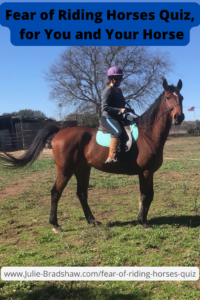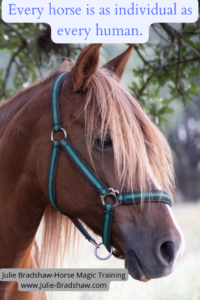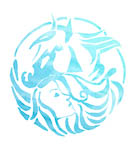Where does your fear of riding horses stem from? You? Your horse? Both? Answer a few questions to get more insight and conquer your fear of riding horses.
Fear of Riding Horses?
It’s not uncommon for even the most seasoned horseback riders to experience a fear of riding horses. It can happen to novice and long-time riders. I’ve found that conquering a fear of riding can be accomplished not only with relationship building with your horse, but some simple tools to get out of your head and into your heart where your love of horses resides.

That’s me in the picture riding my horse Scout for only the 2nd time in almost 4 years. It was a combination of his anxiety and mine that kept me from riding him. But one day, everything came together, and he invited me to ride him.
Invited is the “Key Word” here.
Although he wasn’t the first horse I had ridden since my 20+ years of not riding horses, I really never felt fully safe on the other ones I rode. The day I lifted my very short self (5’3″) onto his very tall back (17.2 hh), I was home. All my fear of riding horses again left and my confidence in riding horses came back that day. More importantly, t has remained.
He truly did invite me that day to ride him. I’ll explain more of the importance and definition of the invite below. But first, a quiz to evaluate what is feeding your horse riding fears and what your horse is telling you.
Questions to Ask Yourself About Your Fear of Riding Horses
Before you ever step foot in the barn, pasture, or arena, regaining your lost riding confidence begins with you. (Also, it truly is only lost, not completely gone.). Notice I say barn, pasture, and arena, not saddle.
Begin with these questions about YOU.
- What are you afraid of? I taught people to trust their intuition and instinct for over a decade. The very first thing I always asked people who wanted to trust themselves more was, “What are you afraid of?” Your first answer may be a straightforward, “I’m afraid of getting injured while riding.” Or, “I’m afraid of what people will think of my riding.” While those are common and legitimate reasons for being afraid to get back in the saddle, sometimes you can dig a little deeper.
- What are you REALLY afraid of? While getting injured is certainly a very real concern, sometimes the true fear lies deeper than the actual injury. Maybe you’re afraid of being out of work and losing income, having someone to take care of your family, pets, or horses, a stack of medical bills, or what people will think of you getting injured. And here we have that other issue again, a fear of what people will think. It’s a common fear that holds many people back from doing the things that they love to do, the things they are MEANT to do.
- What do you hear the people saying? If fear of judgement or criticism is your answer to your fear of riding, what do you hear people saying when that fear bubbles up? I know you hear them right now. Is it that you’re too….something? Too inexperienced, too short, too tall, too overweight, too this or too that? Perhaps, you don’t have the right seat or timing or heel position? Your tack is not expensive, or doesn’t match? Your horse is too….green, old, Arabian-ish?
Questions About Your Horse
The questions you ask about your horse are just as important as the questions you ask about yourself. Every horse is as individual as every human.

The questions you ask about them will be both about them as a horse, and about your relationship together. The answers they give you may be surprising.
- What is your horse afraid of? It may be more than a plastic bag or a tarp. What do you notice that they are afraid of? Like you, they can be afraid of getting injured. In fact, as prey animals, it is their #1 fear. So, you may have that in common. However, they don’t ever worry about what others think of or say about them. (More on detecting their fears below.)
- What is your horse feeling? While they don’t worry about what others think, they do have feelings. And just like humans, it can change from day to day, depending on any number of factors such as diet, pain (or the lack thereof), herd mates, exercise, weather, boredom or engagement, and overall physical health. Past trauma or experiences can influence them as well. Knowing each day (or visit) what they are feeling can give you insight. What they are feeling also may be related to what YOU are feeling, or even thinking.
- What does your horse feel about you? Sometimes it’s difficult to know what a horse thinks of us and sometimes they make it abundantly clear. I’m not asking you this question based on their behavior alone. What does your gut tell you? If I asked you, tell me in one sentence what your horse thinks about you in the next 30 seconds, what would you say?
Your Quiz Answers
Those judgmental voices you were hearing? They were YOUR voices. Yes, people can be critical and judgmental, but the things that hurt the most from some of those people, do so because they are the fears and doubts we ourselves have. We truly are our own worst critic.
When you recognize the voices as yours, or maybe those of someone in your past, and recognize they aren’t true, then you can decide that you want to think differently. Yes, it really can happen that quickly.
You can decide you don’t want to have those beliefs anymore. Then you get to ask yourself, “What do I want to feel instead?”
Your Horse’s Quiz Answers
Horses show fear in numerous ways. While it can be a flick of an ear or tail, the signs can be much more subtle or show up in ways you haven’t thought about. Their eyes or mouth can get tense, and even their muzzles might twitch or shift position. Are they moving their legs or locked up?
They may turn their head away from what they are concerned about OR to SEE what it is they are concerned about more fully. Which is it?
Start paying attention for these and other signals on the ground as you approach, and you might be surprised what you notice. Don’t wait until you are close, start looking from 20 feet away for instance.
Acknowledging your horse’s feelings as an individual can bring an instant shift to the relationship. When they see and feel that you are paying attention, the trust they have in you grows.
Summary and Suggestions for Overcoming Your Fear of Riding Horses
I mentioned that Scout invited me to ride him that day. How did he invite me? He stood near the barn (not his favorite place), wasn’t worried about where the other horses were (his separation anxiety was extreme and neurological), and he let me lean on his back. Plus, I just felt it. I felt him, and he felt me.
Your horse knows how you are feeling, and yes, sometimes even what you are thinking. There I said it, horses can be telepathic. One great tip to decrease your fear is to speak your feelings out loud to your horse. Horses don’t want you to not feel anger or grief or fear. What they want you to do is own those feelings. If you speak them out loud, you are taking ownership and very often, the fears, or other emotions, dissipate.
Just like people, horses can feel that you’ve shared something vulnerable with them. Very often they will acknowledge your vulnerability with some of their own.
Find those limiting beliefs, that critical self-talk, the voices of people from the past, and replace them with empowering beliefs. Deepen the relationship with your horse. Be aware of THEIR fears and their emotions.

This is incredible! I know nothing about horses and have ridden VERY little in my life. But after reading this, I want to start life over, have a horse, and ride as him or her as my best friend.
You are so insightful, Julie! I can tell that horses are an integral part of your very spirit.
You know Cindy, I went 20 plus years without horses in my life and as long as I have the means and ability, I will never be without them again. If your heart is calling you to get a horse, then you should listen. It’s not always easy, but it’s so worth it.
And yes, indeed they are part of my spirit. I love the way you express that.
I love learning about horses behaviors and what they mean so you can understand them better and build a relationship with them.
Their behavior is so fascinating to me too Cindy! It is no different than a relationship with another human, communication is key, and you have to understand the other party’s “language” to communicate well.